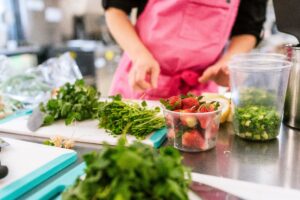
iStock
The quote “Let food be thy medicine and medicine be thy food” by Hippocrates loosely translates that our dietary choices are the total of our health. The World Health Organization suggests that most diseases among the elderly are due to dietary choices, with some operating since infancy. Compounded with the aging process, older persons are particularly vulnerable to malnutrition. Caregivers providing care for seniors are tasked with creating a well-balanced diet to limit common illnesses and diseases. These simple tips can promote proper nutrition for seniors at home.
-
Focus on Foods High in Nutritional Value
Aging affects an individual’s energy levels and develops joint or muscle complications. Such changes decrease physical ability, slow down metabolism, and lower caloric needs. Therefore, it is important to focus on foods with high nutritional value such as fruits and vegetables, whole wheat and grains, low or non-fat milk, plant protein, and lean meats.
-
Moderate Empty Calories
Empty calories are high in calories and have no nutritional value. Most of these foods are highly processed, sugar, and salt dense and contain saturated or trans fats. While they can be difficult to avoid for most completely, they should be consumed in moderation.
-
Practice Nutritional Diversity
Eating the same foods becomes boring over time. Caregivers should diversify nutritional options in the senior’s diet plan. Options can include experimenting with new foods that have different textures and colors. Diversity encourages independence for seniors and also prevents repeating meals.
-
Follow Recommended Servings
To maintain healthy body weight for seniors, caregivers should provide portion sizes based on recommended servings. Using their age and weight, caregivers calculate the required caloric intake for seniors and use this information to create a healthy meal plan.

Unsplash
-
Hydration is Key
Keeping seniors hydrated should be a priority for caregivers. Avoid sugary drinks, alcohol, and caffeine that can cause dehydration. Regularly sipping on water, drinking vegetable and fresh fruit juices could prevent constipation, urinary tract infections, and dehydration.
-
Read Nutrition Fact Labels
Before caregivers cook or purchase any packed foods, it is important to read the nutrition fact labels. Some foods have added preservatives to extend their shelf life, and these preservatives could have severe health consequences. Read these labels to ensure the foods provide nutritional value and are safe for seniors.
-
Plan and Prepare Meals in Advance
Planning and advance meal preparation ensures that seniors have healthy meals available all the time. It prevents unnecessary snacking on unhealthy food and ensures that they stick to healthy home-cooked meals. Even when the caregiver is absent, prepared meals’ availability guarantees adherence to the recommended meal plan.
Need help with meal planning and preparation for a senior loved one? Caregivers at Immaculate Home Care Services are trained to provide the necessary dietary support for seniors. Give us a call or email us today.
-
Season food with Fresh Herbs and Spices
Healthy food does not have to be bland and unseasoned. Therefore, using fresh herbs and spices to season food for seniors is a better option for overly refined and processed spices.

-
Involve Seniors in Meal Preparation
Making cooking a fun social activity can motivate seniors to eat healthier foods. Caregivers can schedule cooking activities that allow seniors to get together and prepare a healthy meal. This way, they learn new ways to prepare healthy foods while having fun with their fellow seniors.
-
Seek Professional Help
Inexperienced caregivers can seek professional help from nutritionists for diet advice. A nutritionist will prepare a plan detailing caloric requirements and the required portion sizes for every meal. They will also include healthy snack options and a few comfort foods.
-
Limit Take-Out or Eating Out
Caregivers should schedule a day to take out or eating out to avoid overindulgence in fast foods. With very little information on these foods’ preparation process, some of the ingredients used could have potential health risks on seniors.
-
Encourage Physical Activity
Supplementing proper nutrition with physical activity improves overall health. Simple activities such as taking walks or home exercises can go a long way in improving seniors’ quality of life. They can remain active and independently engage in day-to-day activities.


